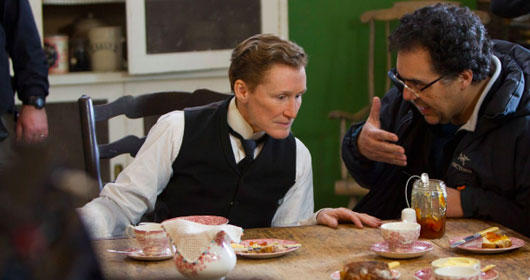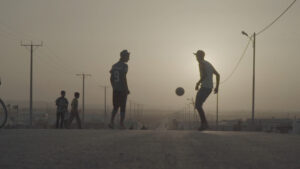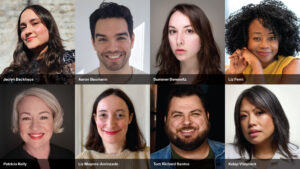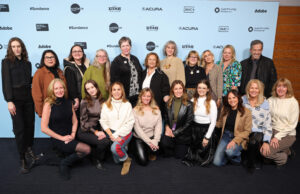Close listens to director Rodrigo García on the set of Albert Nobbs.
Sundance Institute
Throughout Glenn Close’s distinguished career—she’s received an Emmy, Golden Globe and Tony Award, plus six Academy Award nominations for acting—she has been a fierce advocate for independent film. As part of last night’s Sundance Institute Celebration benefit, Glenn was honored with the Vanguard Leadership Award for her ongoing commitment to the indie film community.
Also recognizing the emerging guard, Sundance Institute honored filmmaker Damien Chazelle with the Vanguard Award, Presented with The Lincoln Motor Company. Damien wrote and directed the brilliantly blistering feature Whiplash, about an aspiring drummer. Whiplash premiered at the 2014 Sundance Film Festival and won both the U.S. Grand Jury Prize: Dramatic and the Audience Award: U.S. Dramatic Presented by Acura.
Before they took the stage last night to receive their new accolades, Glenn and Damien recently conversed about starting and maintaining a life enriched by the arts—and the importance of channeling your inner child to make play part of the work.
Glenn Close: So, Damien, I just saw Whiplash. I didn’t get a chance to see Whiplash at Sundance at your big screening. But I saw it just a couple of days ago. And I thought it was incredible.
Damien Chazelle: Thank you so much.
GC: You wrote it, right?
DC: Yeah, I did.
GC: Are you a drummer yourself?
DC: I am. Well, I should say I used to be. I grew up playing a lot of drums, specifically jazz drum, and then I did it in high school and into college. And I just kind of burned out on it. And I haven’t really returned to it much since. But I had a teacher like that—my high school band leader. So a lot of that was easy to access and write about.
GC: Wow, he was that mean?
DC: Well, no, he wasn’t that bad. He was actually OK. It was more the emotional manipulation. I remember feeling so terrified all the time having to play for him. It’s just that feeling. I’m always curious with any performers and especially with actors: Did you either have teachers or coaches like that or have you had to deal with feelings of stage fright or the fear of performing? Has that been a factor for you?
GC: It’s funny because I was extremely shy when I was little. Not within my family circle, but outside, very, very shy. I remember when I first went to New York after I had graduated from college, I had an in to Harold Clurman’s class. He was a great acting teacher. So I slipped in at the back – of course it was packed – and somebody did a scene. And then the actual kids, the people who were attending the class, did the critique and that terrified me. That just terrified me! And then Harold Clurman, who was quite old at the time, told anecdotes for another 15 minutes and that was it. And I said, “I cannot do that.” To have my peers critiquing me, it’s terrifying. So I never took an acting class as such because I guess I was too shy. I think acting really is imagination and play – you can imagine yourself into somebody else’s shoes. That takes a lot of thought. But it’s also being willing to just play.
DC: That’s a wonderful way of looking at it. Even on my side, I was working with a cinematographer on a short I did. And he said something that always stuck in my brain: “Look, at the end of the day, all we’re doing is playing dress up. At the end of the day, this is all make-believe.” I know my disposition is to take things very seriously and get very easily stressed and anxious – and you see a lot of that in the movie – so that was a nice thing to hear at that moment. I remember when I was doing little home movies as a kid, I didn’t care, really, what people would think of it. When I did stuff as a kid, I just did it for myself. And I find now that I’m always trying to get back that feeling of innocent play that you have as a child where you’re not worrying –you just do it for yourself. And that’s so hard to hang onto in a career.
GC: Yeah, one of my favorite books – actually I talked about it at Sundance, I think it was at the Lab – it’s by Richard Eyre, one of the world’s greatest directors. He wrote a book called Utopia and Other Places.
DC: I’ve heard about it, but I haven’t read it.
GC: It’s fantastic. He wrote that he thought if you scratch an actor, you’ll find a child. But someone childlike – not childish – but childlike in their ability to be able to play and imagine.
DC: Yeah. So you eschewed the acting class route other than that one experience. How did you find yourself going into acting? Was it something that bit you early on?
GC: I grew up in the Connecticut countryside just pretending all the time with my sister, who was the head of our little gang. I was usually my sister’s sidekick. We were both cowboys. And then we had puppets that we played with. So it was all just what we could work up and pretend. And it was fantastic. And then I was very, very influenced by the early Disney movies – I wanted to run away and knock on Walt Disney’s door and have him put me in his movies.
But then my life took a different turn, and I went to the College of William and Mary. I was a 22-year-old freshman. I walked straight into the theater department and auditioned for their first play. I did theater, stagecraft, costume design, and all that as a theater major at William and Mary. That was basically my training. And from there I got a job the fall after I graduated in New York with a theater company. So once I decided to go for it, it was a pretty straight line going to New York and actually leaping into that very big pond. I think people who are shy always have a lot going on in their heads. And I think I’ve always been that way. So it just seemed natural to go from my vivid internal imagination to a career in acting.You said you did a short.
Was that your first film, the short? Did you go to film school?
DC: I didn’t go to film school. I just had a normal undergrad experience. But I did a very low-budget, feature-length movie that was pulled off by the skin of my teeth as I was graduating school and moving out here to L.A. And so I’d done that and did some festivals with that. Then I was writing for hire for a little bit, and out of that I wrote the first draft of Whiplash. We did a short specifically to help raise money for the feature – we pulled a scene from the script and did it that way. And then we shot the feature. So that’s one low-budget feature, one short, and Whiplash. Those are three things I’ve done. All deal with music in some way.
GC: Do you like working with actors or do actors intimidate you?
DC: I absolutely love it. But sometimes, sure, they do intimidate me. I feel like all directors are probably secretly intimidated by actors – they just don’t admit it. I think it’s that dance you have to do to both make them feel comfortable but also to make sure you’re getting what you need. I think I got lucky in that I was surrounded with people who fit into the roles and were willing to really work hard. So I think they cut me a lot of slack. I was able to navigate the set very easily thanks to the people who were in the cast.
GC: So the casting was obviously crucial, because then you could trust the actors’ instincts and it didn’t go against your vision of the film.
DC: Yeah, casting was a lot of fun. It was the first instance where I was working with trained thespians and with a codified script. That mode of working was new to me, but it felt very liberating in that so much of it was figured out in the casting. And as soon as we had the right people in the right parts, then you could let them run wild on set a little bit. I found myself not even having to micromanage on the set as much as I had done in the past, because at a certain point, you hope you’ve cast it right and then you trust them to take it from there.
GC: As an actor I really respect the writer. What’s on the page is the beginning – writing that you really, really love. When I break down scenes, I sometimes find words that just don’t come out of my mouth right. So I work at it, work at it. And if I can’t solve the problem, or if it’s still giving me what I call “brain blips,” then I’ll go to the director and say, “Can I talk to the writer about this? This spot is not sitting right in my brain.” I love the precision of words and how they relate to characters. Are you saying exactly what you mean? I learned a lot about that process in doing Damages with those wonderful writers. I do think our first job is to try to realize and embody the writers’ vision.
DC: Just speaking about sticking to the words in the text: I remember it may have actually been the first film of yours that I ever saw – Zeffirelli’s Hamlet. I didn’t know Shakespeare at all. And I remember my parents went out and left me with a babysitter one night to go see a movie. They were going to see Hamlet, and I remember my mom describing to me the story of Hamlet and it sounded so fascinating that I just felt like I had to see the movie. So as soon as it was out on VHS, I watched it. And I didn’t understand any of the dialogue, but I still have such a clear memory of watching and following the story. And I particularly vividly remember – and it remains one of the scariest things I’ve ever seen in a movie – the scene toward the end where it becomes a series of close ups between you and your point of view of the cup you’ve just drunk from, and you realize you’ve drunk the poison. That silent, pure cinema moment … as a kid I could obviously understand that moment completely clearly. It’s just so remarkable. It’s an argument for why Shakespeare does work on screen, because there’s something about the close up in that moment that only movies could do. It’s really beautiful.
GC: I think close ups are a director’s way of keeping an audience emotionally involved. Only movies have close ups. Gertrude, I loved that character. Playing her was a great experience. She’s very underwritten, but I think she’s a fascinating character. Zeffirelli gave me a beautiful image that sparked my imagination: “The halls of the castle are filled with her perfume.”
Do you like the being in the editing room? I thought your film was really well edited.
DC: Thank you. I had a great relationship with my editor, Tom Cross. He’s a great guy, and we really saw eye to eye. Editing is the most just sheer enjoyment that I get out of the process. It doesn’t match the exhilaration of being on set for me, where you’re creating the thing, but there’s something about sitting in a dark room, in a vacuum – not care what time it is, not have an AD telling you to move on, being able to pour over a single cut. That really gets my pulse racing. It’s funny because when you’re on set, you’re trying to make sure that you’re allowing the room for a performance to occur. And then when you’re in the editing room, you get a whole other chance to refine it, or even completely subvert it, or just showcase it. It’s really fun. I love it.
GC: Starting on stage is a great training ground because you have to come up eventually with a seamless journey from the opening curtain to the closing moment. That is about craft and discipline. I did theater for six years before my first film, and it still kicks in with me – I tend to think that every take has to be perfect. It took me a long time to learn that one little moment on a shitty take can be gold. Now I love when directors say, “Try something else,” because you don’t know what will work in the editing room. There are many different ways to work a moment within the context of a scene. So the more choices a director has once he gets to the editing room, the better off everyone is. That’s something I had to learn.
DC: I’ve had to learn it, too. I’ve gotten less surprised having worked a little bit, but I guess it still surprises me and it happens all the time – there’s a take on set that, while I’m watching on set, I think is the greatest thing ever, and then maybe we did another take after that and I didn’t think that was nearly as good. And then I go into the editing room and the context changes and suddenly I feel exactly the opposite. The one you thought was great is not so great and the one you thought was disposable is actually brilliant. You’re always trying to make your best guesses on set, but it’s really a sketch work.
GC: Did you ever go to a Sundance Lab?
DC: I didn’t go to a Lab they actually physically hold. With this movie I sent them the script, and they wound up providing the grant via Cinereach and sending the script to a few people whose work I admired to get their feedback. It was so simple and nice. It was great. You’ve participated in a few of the Labs, right? You’ve also been there as a teacher or mentor?
GC: Yeah, I did a Theater Lab. It was a while ago. I’d do it again. It was really, really fun. I just love the whole process. It’s so wonderful to witness people hearing their words for the first time, whether it’s in a film or a theater piece, and to watch them having to direct somebody. It’s just great. And the generosity of the people who are there and help is great. It’s not: “Do it my way. This is the only way.” It’s: “You need to find your own voice. So what is it? What is your vision and how can we help you realize it?” That’s what has always impressed me.
DC: That was one thing I really liked about when I was in school. It wasn’t a film school, but there was a film department. It was very small and under the radar, mainly documentary. But what I really liked about it was that they didn’t try to impose a certain sensibility on you. They really tried to just let you be the best version of what you could be.
GC: What school did you go to?
DC: Oh – Harvard.
GC: Oh that school. [Mutual laughter.] What did you major in at Harvard?
DC: The major was called visual environmental studies. It’s their highfalutin way of referring to their arts department. It was very much a kind of “Hollywood is evil” mentality there, which actually was the greatest training I could have hoped for before going to L.A. It’s the backbone that I try to use as a barometer if I ever feel like I’m going too far, because L.A. just distorts things so easily. I’m thankful that at least I had this rigorous, anti-commercial education. It’s good. I forget, are you based in New York now?
GC: I’ve always been based in New York. I like being able to walk around looking like a bag lady and not worrying about it, and you can certainly do that in New York.
DC: I love New York. Whenever I’m there for a little bit I want to move.
GC: There’s just incredible energy. It’s a very exciting place now. What do you have in the works? Do you have another script?
DC: I have a script that I had started to work on before Whiplash and put on hiatus. I’m getting back into it now and hoping to make that next. That’s the main thing I’m working on now, trying to tinker with that and get it up to speed. And I’ve just been thinking of some other ideas, but those things are more on the horizon. I’m hoping to do this next one at the end of this year and top of next year. Do you find it hard to sit through your films or watch yourself on screen? Or, as you act more and more, have you come to peace with it?
GC: Well, I don’t spend time looking at myself in movies. But I have to say, about the making of Albert Nobbs, it was an incredibly wonderful experience. I am so proud of the movie and really loved everyone’s performances. And I love the score.
DC: It’s a beautiful film.
GC: Yeah, I didn’t sit through all of the screenings, but I sat through a lot of them because I was interested in how audiences reacted.
DC: With Albert Nobbs, you had played the character on stage. By the time you did the film, did it feel like slipping into old clothes, or did it feel like you had to rebuild the character from the ground up?
GC: Well, I had played it 30 years before. So I had 30 years, literally, of experiences as an actress. So it really stood me in great stead. The essence of the character was the same, but I think it had, oh my God, five times the resonance because of what I brought to it from the point of view of someone who has just been around longer. It was also really fun to write it, because, first of all, I wanted to write parts that good actors would want to play. I would ask myself, “Would I want to play this? No, not yet. I better work on it a little bit more.” What was joyous for me was the process. Those of us who create have that. You come up with material and then you gather your team. And, if you have a great team, it’s an amazing process of collaboration and inspiration. Everyone keys off each other. Together you’ve created something you’re proud of. And you just hope that you have the right marketing and the right distributors to get the biggest numbers of people to see it. For me, if I feel that the process has been great and we’ve created something that I’m proud of, that’s all that counts. I don’t think about making money. I know that sounds naïve.
DC: Well, that’s like going back to the childlike state. That’s what I try to remember – that it’s about the process. It’s about the joy of creating and not about the dividends, or “Are people going to hate it or love it?” or “Are people going to see it?”
GC: I think independent film, if you’re going to make a gross generality, it’s not formulized like most of the bigger stuff coming out of Hollywood. So you have all these independent voices and these independent stories. And I think what I need to learn is that, as much as we want to say something and realize our vision, there is another dimension to it, which is: Put yourself in the audience’s shoes and try to figure out what they would get from it as you are articulating it at that particular moment. Because if you don’t connect with your audience, you might as well be shouting in an empty room. It won’t make any difference. I always want to give people an emotional experience because I think that’s what people remember. As an exercise, I need to try to be more objective. I mean, as an actor, the luxury of having a wonderful director is that we can be subjective – you don’t have to worry about being objective. But as a storyteller, I think it’s really important to remember who I am talking to and am I saying it in a way that will affect people.
DC: That’s it’s own rabbit hole. I totally agree. Yeah, it’s so tough. But the one thing that I feel like I am in the process of learning – and feel more and more strongly every time I do anything – is that, at the end of the day, the most important thing is the emotion, and it’s that specific emotional response that you’re working toward that’s more important than any intellectualizing. I guess I’ve become less intellectual in my approach to things and more focused on trying to create or elicit that emotion. I think that’s what it all boils down to. So at least simplifying that in my mind helps me to a certain extent. You still don’t know if you can get that emotion, but at least it helps give you a through line.
GC: Well, I think you really do hit wonderful emotional moments. And I think you make a huge emotional connection at the end in Whiplash. So bravo to that!
DC: Oh, well, thank you.
Glenn Close is an emeritus trustee of Sundance institute and has served as a Creative Advisor at its Labs for emerging independent filmmakers. She has appeared in several films at the Sundance Film Festival, including Cookie’s Fortune, Things You Can Tell Just by Looking at Her, Heights, The Chumscrubber, and Nine Lives. Damien Chazelle received a development grant and dedicated screenwriter mentors from the Sundance institute Feature Film Program for Whiplash. Before Whiplash premiered at the 2014 Sundance Film Festival, his short version of the film won a Short Film Jury award at the Festival in 2013.




